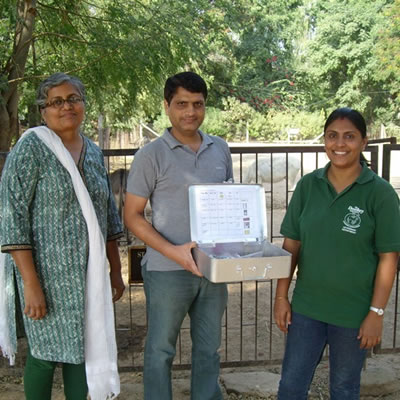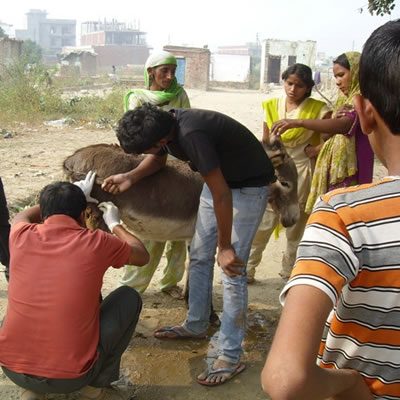
And photographs, if you have any.
Horseytalk.net Special Interview
Liz Gaffer
Why I spent my holidays with the donkeys in India - Liz
Says Emma Gill
Supporter Liz Gaffer would spend all of her time with donkeys if she could, so when deciding to take a holiday in India, she made sure she spent some time with The Donkey Sanctuary’s teams there. Her blog provides a snapshot of her time in the country.
Ahmedabad
 Like many cities in India, Ahmedabad is seeing a huge amount of growth and with that, a large amount of construction work. Donkeys play a big role in this industry, moving bricks and building materials around the sites, which is tough and gruelling work. The Donkey Sanctuary runs a haven for ill and injured working donkeys at Chharodi Farm, the charity’s base situated about 10km outside of Ahmedabad.
Like many cities in India, Ahmedabad is seeing a huge amount of growth and with that, a large amount of construction work. Donkeys play a big role in this industry, moving bricks and building materials around the sites, which is tough and gruelling work. The Donkey Sanctuary runs a haven for ill and injured working donkeys at Chharodi Farm, the charity’s base situated about 10km outside of Ahmedabad.
Charity staff in Ahmedabad, India
with a building site medical kit. >>
The team there have a great model of operation, from showing children in schools how to look after donkeys, to educating owners on how to treat donkeys their donkeys should they become injured. This education is vital. Veterinary surgeon Saroja told me that donkeys really benefit from the increased knowledge of their owners, which had brought to end harmful traditional practices - like treating wounds with battery acid or kitchen-cleaning fluids - which were previously considered to be beneficial.
In this area of India it is traditional for owners to ‘hobble’ their donkeys – tying their legs so that they can walk, but not run. Unfortunately owners used to use plastic for this purpose - and you can imagine the injuries from this - but thanks to a link with a local clothing manufacturer and the education from the Ahmedabad Donkey Sanctuary team, ‘hobbles’ are now made from soft, skin-friendly materials. Owners are asked to make a contribution towards these items, but the balance is covered by the donations supporters make to the charity.
The Ahmedabad team have also trained a number of volunteers on building sites in the area to carry out simple emergency treatments on donkeys themselves. The medical kit in the picture (which costs 750 Rupees, approximately £9) contains the basic tools to treat minor sores and wounds, which the volunteers are trained to use. This means that donkeys will suffer less, as they do not have to wait until the charity’s next visit for the initial treatment of minor wounds and sores which could develop into more significant problems.
Delhi
 The Donkey Sanctuary’s Delhi team work out and about in the community with donkey owners. On the day that I was with them, the team took a couple of calls relating to donkeys suffering from dog bites. Although I have supported animal charities for years and seen some awful pictures along the way, I wasn’t prepared for the condition I saw these donkeys in, and I was overwhelmed to see how well The Donkey Sanctuary team handled the situation.
The Donkey Sanctuary’s Delhi team work out and about in the community with donkey owners. On the day that I was with them, the team took a couple of calls relating to donkeys suffering from dog bites. Although I have supported animal charities for years and seen some awful pictures along the way, I wasn’t prepared for the condition I saw these donkeys in, and I was overwhelmed to see how well The Donkey Sanctuary team handled the situation.
Delhi team treat donkey
with a dog bite >>
Saswati, the team’s Community Development & Education Officer, talked to the owners, got to know the background to the situation and gently suggested how conditions might be improved for the donkeys. Saswati’s colleagues Ajoy and Mohinder cleaned the donkey’s wounds and gave some painkillers. Whilst doing this they also showed the owners how to continue the treatment once they had left. The owners of these donkeys live on very little indeed, and were immensely appreciative of the support they were being given by The Donkey Sanctuary.
Although personally I felt very upset seeing the donkeys that had been injured, I was glad to see how well they were being cared for thanks to the work of The Donkey Sanctuary. I now know where my donations to The Donkey Sanctuary go, and I have seen firsthand what a difference they make. In India, every pound really does help.
The Donkey Sanctuary has been working in India since 1988, providing all-year-round community education, veterinary treatments and improvement of harness, helping thousands of donkeys. The charity’s projects operate from Ahmedabad, Gwalior, New Delhi, Rajasthan and Solapur and cover numerous villages, brick kilns and city sites. For further information about the charity’s work in India, please see Our work in India section.




